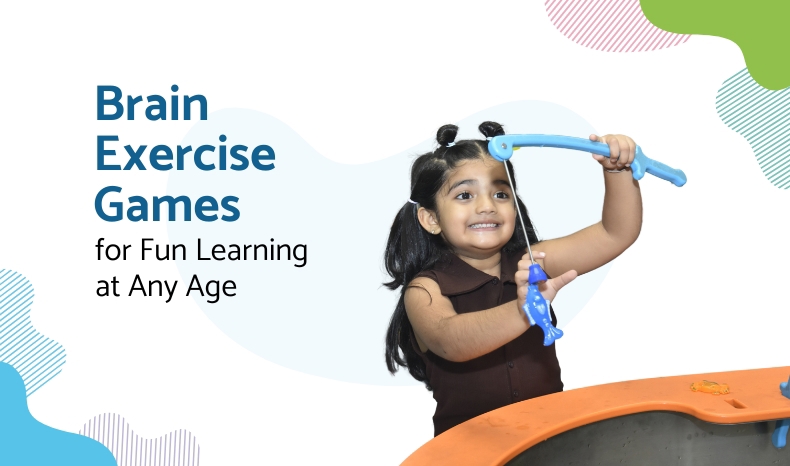Brain Exercise Games for Fun Learning at Any Age
Keeping your brain sharp and active is important for everyone, especially kids. Brain exercise games help kids learn while having fun.These activities not only engage young minds but also lay the foundation for lifelong cognitive agility and learning. Let’s explore some engaging activities that boost mental agility, problem-solving abilities, and memory power, making fun learning accessible for all ages.
Fun Brain-Boosting Activities for Kids
Children learn best when they are having fun. Engaging them in brain exercise games encourages curiosity and builds critical thinking skills. Here are some exciting activities to explore:
Games to Improve Concentration
Helping kids focus is important for school and everyday activities. These games can make it easier for kids to pay attention by improving focus and listening skills. Not just that they also help children excel academically and develop essential life skills like patience and attention to detail.
- Simon Says: A classic game that requires listening carefully and reacting quickly to instructions.
- Spot the Difference: Enhances observational skills and attention to detail.
Challenging Puzzles
Puzzle brain exercise games are perfect to stimulate problem-solving and critical thinking amongst the children:
- Jigsaw Puzzles: Encourage spatial reasoning and patience.
- Sudoku for Kids: Simplified versions of Sudoku sharpen logic and number recognition.
- Tangrams: A fun way to explore geometric shapes and spatial arrangements.
Memory-Enhancing Games
Memory brain exercise games offer long-term benefits for children.
- Matching Card Games: Improves recall and pattern recognition.
- Memory Tray: Place items on a tray, let children observe, then cover and remove one item to test their memory.
- Kim’s Game: A classic memory game that boosts visual and tactile recall.
Physical Activities for Cognitive Growth
Combining physical movement with brain exercises supports overall cognitive development. Such activities stimulate the brain by creating new neural connections, improving memory, and increasing the ability to multitask. Activities like Cross Crawls, where children touch opposite hands to knees, improve coordination and brain-body connections.
Learning a New Language
Introducing kids to a new language enhances cognitive flexibility and problem-solving. Apps like Duolingo or Rosetta Stone for kids make this process interactive and enjoyable.
Lazy Eights for Focus
This calming activity involves drawing the number eight on its side in a continuous motion. It boosts concentration and hand-eye coordination while also helping children relax.
Double Doodle Drawing
Encourage creativity and fine motor skills by letting kids draw with both hands simultaneously. This bilateral activity is fun and strengthens brain hemispheric communication.
The Elephant Exercise
This activity involves mimicking an elephant’s trunk and tracing large figure eights (∞) in the air with an extended arm like an elephant’s trunk, promoting focus, coordination, and relaxation through gentle movement.
The Active Arm Routine
This involves repetitive arm movements like tapping, clapping, or reaching. These simple actions stimulate the brain while keeping kids physically active.
Family Game Night
Playing board games or card games as a family strengthens bonds while enhancing critical thinking. These moments not only nurture cognitive skills but also create cherished memories and strengthen family bonds through teamwork and shared laughter. Games like Scrabble Junior or Pictionary promote vocabulary building and creativity.
Word Games for Stretch Thinking
Word-based challenges expand vocabulary and encourage creative thinking. Popular options include:
- Boggle: Find as many words as possible in a grid of letters.
- Hangman: Fun for spelling practice and deduction.
- Story Cubes: Inspire storytelling and imaginative thinking.
Conclusion
Brain exercise games engage children both physically and mentally, combining fun with valuable learning experiences. The games are not only good for cognitive development but also help foster creativity, focus, and problem-solving skills. By regularly engaging in these brain-boosting activities, children not only excel academically but also develop the resilience and creativity needed to thrive in various life situations. Thus, constant practice will inculcate better skills in your little ones and make them love learning.
FAQs
Which game increases IQ level?
Chess, Sudoku, and strategy-based puzzles are a few games that improve IQ levels as they enhance logical reasoning and problem-solving skills.
Which game is best for kids' brain development?
Brain games for kids such as memory games, puzzles, and Simon Says are excellent in developing critical cognitive areas, including focus, recall, and logic.
What are some good brain teasers for kids?
Good brain teasers for kids include riddles like "What has keys but can't open locks? (A piano)" or puzzles such as spotting differences in pictures. Classic games like I Spy, 20 Questions, or simple logic puzzles also work well. Activities like solving mazes, completing word searches, or trying Sudoku for beginners can boost critical thinking and problem-solving skills in a fun way.
What is a Think Quick game?
Think Quick is a game that challenges children to respond rapidly to questions or scenarios, promoting quick thinking and decision-making.





